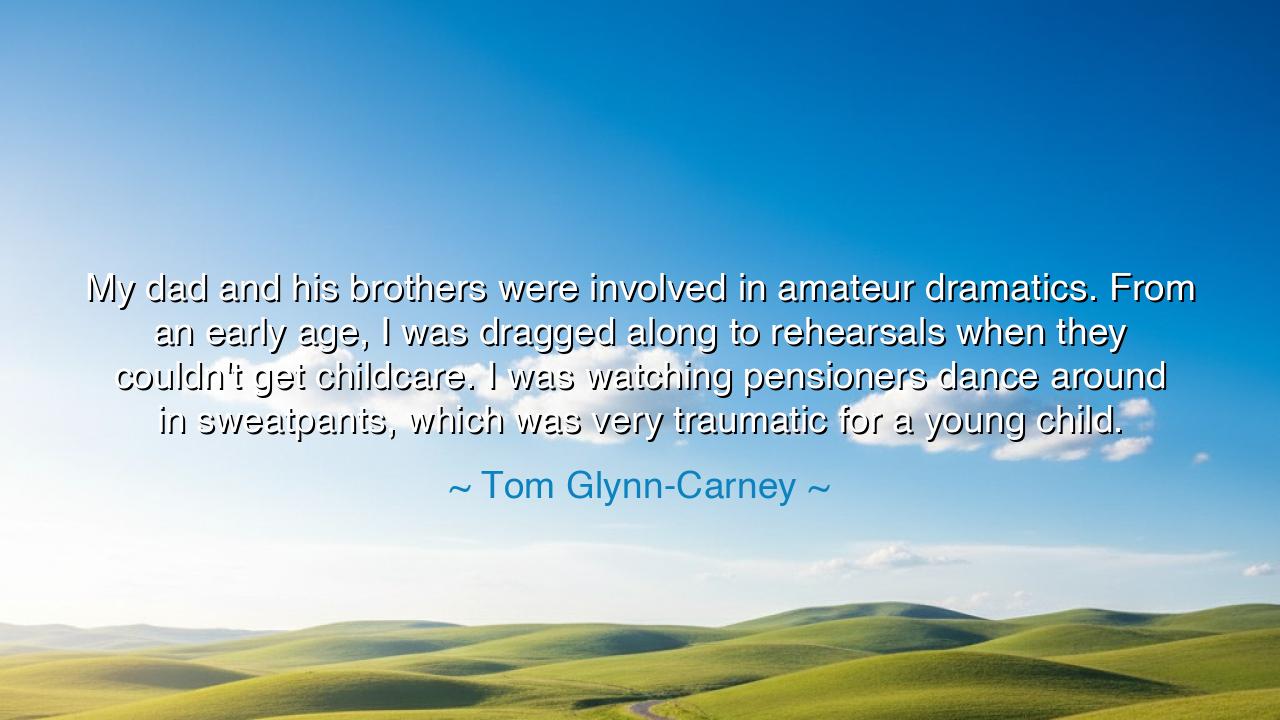
My dad and his brothers were involved in amateur dramatics. From
My dad and his brothers were involved in amateur dramatics. From an early age, I was dragged along to rehearsals when they couldn't get childcare. I was watching pensioners dance around in sweatpants, which was very traumatic for a young child.






In the words of Tom Glynn-Carney, we hear not merely a recollection, but a reflection of life’s earliest lessons hidden beneath the veil of humor: “My dad and his brothers were involved in amateur dramatics. From an early age, I was dragged along to rehearsals when they couldn't get childcare. I was watching pensioners dance around in sweatpants, which was very traumatic for a young child.” On the surface, it is a tale told in jest — a memory of absurdity, of childhood discomfort, of laughter tinged with bewilderment. Yet beneath this lightness lies a profound truth: that creation, exposure, and art often spring not from grandeur, but from the ordinary, the awkward, and the imperfect moments that life gives us when we least expect them.
This quote is not a complaint but a revelation — the understanding that greatness is born in humble places. The child, dragged unwillingly to the stage, becomes the man who later treads upon it with purpose. What once seemed “traumatic” — the sight of pensioners dancing in sweatpants, the disarray of rehearsal halls, the laughter and labor of ordinary folk striving for beauty — was in truth an initiation. The gods of art often disguise their lessons in the most unglamorous forms, for the soul must learn to see wonder where others see foolishness.
In the ancient world, even the mighty Aeschylus, father of Greek tragedy, began his journey not in marble theaters but in the dust of open fields, where the chorus danced barefoot beneath the sun. The earliest actors wore masks carved from bark and painted clay, performing not for fame but for the spirit of Dionysus — god of both ecstasy and madness. The young Tom, watching the trembling feet of elders in their rehearsal sweats, was witnessing the same ancient ritual in modern form: the raw striving of the human spirit to create, to express, to transform life into art, even when the stage is makeshift and the dancers far from divine.
There is a sacred irony in this. The boy’s discomfort becomes the man’s calling. What was once embarrassment becomes inspiration. So it has always been: the seeds of destiny are often sown in the soil of confusion. Think of Leonardo da Vinci, who as a child was mocked for his endless curiosity — dissecting animals, sketching faces, studying the way shadows fell upon walls. His early eccentricities, misunderstood by those around him, became the foundation of genius. So too did Glynn-Carney’s early encounters with the theatre — strange, mundane, and comical — become the quiet fire that would one day illuminate his path as an artist.
The wisdom here is simple yet eternal: Do not despise humble beginnings. Do not turn away from experiences that seem absurd or beneath you. Life’s greatest teachers wear many disguises — sometimes the wise elder in sweatpants, sometimes the weary stage light, sometimes the very boredom that stirs the imagination to life. To be dragged into the world of others is, in truth, to be introduced to one’s own.
In every trauma, there lies transformation. The laughter, the confusion, the discomfort — these are the forges of empathy and observation. The artist is born not from comfort, but from exposure to the unpredictable and the human. To witness others striving — whether gracefully or clumsily — teaches the soul that beauty is not perfection, but devotion. Those pensioners, in their sweatpants, were unconsciously showing the young boy the courage it takes to perform, to be seen, to embrace vulnerability in the name of creation.
Let this be the teaching carried forward: never scorn the strange beginnings of your story. Every awkward scene, every mundane rehearsal, every laugh that once embarrassed you — they are the threads of your tapestry. The child who endures the noise of others’ passions often awakens his own. The fire of destiny is kindled not in grand halls, but in the quiet rooms where ordinary people dare to dream.
Action for the living: Return to your origins. Reflect on what once made you uncomfortable — the moments you thought meaningless, the experiences you wished to forget. Ask what they taught you. Seek not only beauty in the polished and the perfect, but in the raw, the honest, the human. For there lies the true theatre of life, and it is from that humble stage that greatness first learns to speak.






AAdministratorAdministrator
Welcome, honored guests. Please leave a comment, we will respond soon